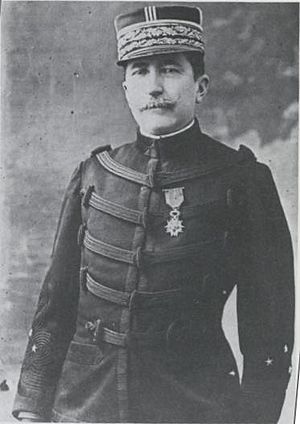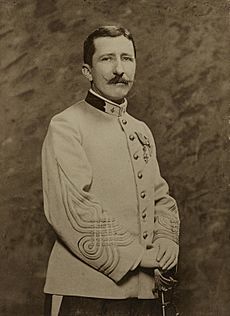Georges Picquart facts for kids
Quick facts for kids
Marie-Georges Picquart
|
|
|---|---|

Georges Picquart in the uniform of General of Division
|
|
| Born | 6 September 1854 Strasbourg, France |
| Died | 19 January 1914 (aged 59) Amiens, France |
| Place of burial |
Père Lachaise Cemetery
Paris, France |
| Allegiance | France |
| Service/ |
French Army |
| Years of service | 1872–1902, 1906–1914 |
| Rank | Général de division |
| Commands held | 2e Corps d'Armée |
| Other work | Minister of War (1906–1909) |
Marie-Georges Picquart (born September 6, 1854 – died January 19, 1914) was an important officer in the French Army. He also served as a government minister. He is most famous for his brave actions during a big event called the Dreyfus Affair.
Contents
Picquart's Early Life and Military Training
Picquart was born in Strasbourg, a city in France. He started his military career in 1872. He was a very bright student, graduating as one of the top students from the Ecole Spéciale Militaire de Saint-Cyr, a famous military school.
After his training, Picquart worked as an infantry officer in France. He also served in French Indochina, which is now part of Southeast Asia. He then continued his studies at the General Staff Academy. There, he was again one of the best students.
Later, Picquart became a teacher at the War Academy. One of his students at this academy was Alfred Dreyfus.
Picquart's Role in the Dreyfus Affair
Picquart was later assigned to the General Staff in Paris. This was a very important position in the army. He helped report on the first military trial of Captain Alfred Dreyfus. At this time, Dreyfus was wrongly accused of being a spy.
In 1895, Picquart became the head of the army's intelligence section. This group was in charge of gathering secret information. The next year, in 1896, Picquart made an amazing discovery. He found out that the secret document used to convict Captain Dreyfus was actually written by another officer, Major Ferdinand Walsin Esterhazy.
Picquart was brave and wanted to tell the truth. However, some high-ranking generals told him to keep his discovery a secret. But Picquart kept investigating. Some officers working under him even tried to stop him. Because of his efforts to uncover the truth, Picquart was removed from his intelligence job. In December 1896, he was sent to lead a regiment in French Tunisia, far away from Paris.
After a famous writer named Émile Zola published a letter in 1898, Picquart himself was accused of making up evidence. He was even arrested and faced a military trial. Meanwhile, a high court in France was reviewing the Dreyfus case.
In 1906, Alfred Dreyfus was finally proven innocent. This also cleared Picquart's name. The French government then promoted Picquart to a higher rank, brigadier general. This was the rank he would have likely reached if his career hadn't been interrupted by the Dreyfus Affair.
Picquart's Later Career and Life
After the Dreyfus Affair, Picquart continued his public service. In 1906, he became the Minister of War in the government of Georges Clemenceau. He held this important position for about three years, until 1909. After that, Picquart went back to serving in the military as an Army Corps commander.
Picquart was also a talented amateur pianist. He enjoyed visiting the Chaigneau family, whose daughters formed a musical group called the Trio Chaigneau. He even helped them arrange concerts.
Picquart's Death
Marie-Georges Picquart was still an active army officer when he died. On January 19, 1914, he passed away in Amiens, France. He was 59 years old. His death was caused by injuries he received after falling from a horse.
See also
 In Spanish: Marie-Georges Picquart para niños
In Spanish: Marie-Georges Picquart para niños
 | James B. Knighten |
 | Azellia White |
 | Willa Brown |


